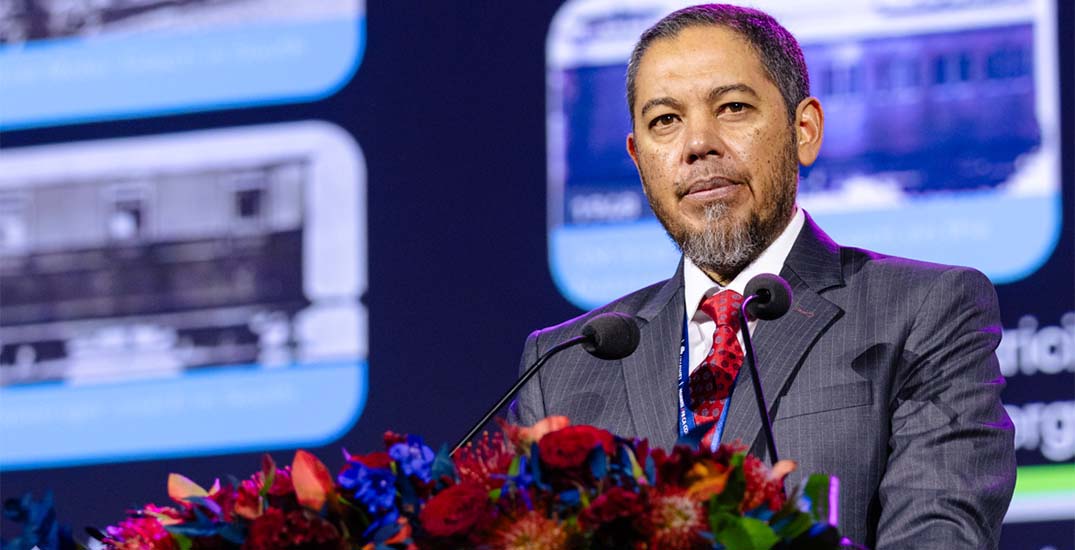Kathy Gibson reports – The Passenger Rail Agency of South Africa (Prasa) has a bold plan for modernising the country’s railways, and will invest over R100-billion in the process.
This is the word from Hishaam Emeran, CEO of Prasa, who says the agency has a clear mandate to accelerate the recovery of South Africa’s rail systems.
Emeran points out that the railways in South Africa have a history going back more than a century, having witnessed the industrial age, the age of electrification, the information age and now the era of intelligence.
“And we need to move into the new era,” he tells delegates at the Huawei Africa Connect conference taking place in Sandton.
The R100-billion modernisation plan encompasses infrastructure, signaling, switching, ICT and rolling stock.
“We are already rolling out modern new trains that are being manufactured in South Africa,” Emeran says. In fact, the African Union (AU) has decided that South Africa will manufacture rolling stock for the whole continent, and the Prasa-owned facility in Nigel is gearing up for this.
The overall plan rests on seven pillars:
* Acceleration of service recovery;
* Enhancing safety and security;
* Modernisation of assets;
* Financial sustainability;
* Digital transition;
* Operational excellence and governance; and
* Human capital and stakeholder management.
It’s no secret that Prasa has been largely dysfunctional for several years, and the recovery plan is sorely needed.
“Coming out of Covid, we were operating just four out of 40 rail corridors,” Emeran says. “This is why we need to accelerate the recovery of existing assets.”
Digtilisation is a common threat that underpins all of the pillars, he adds, and is particularly relevant for integrated security.
The plan is not just words on paper, Emeran stresses. “We are actually implementing them.”
The agency is already moving forward on digital modernisation. This started with ensuring the adequacy of the existing ICT infrastructure and will then move to innovating for a digital future.
“We are optimising for efficiencies, and improving capability, governance and compliance,” Emeran says.
Cybersecurity and risk management have been identified as key areas that need attention, and Prasa is working to evolve these processes and systems.
People are key to digitalisation and modernisation, so the agency is actively building a high-performance and digital-ready talent pool.
Emeran points out that the modernisation process is well underway, and Prasa has already achieved a number of notable milestones.
“We have reopened 78% of the 40 rail corridors,” he says. “And have refurbished 263 of the 368 stations.”
In the last year, Prasa transported 39,4-million commuters, up from 16-million in the previous 12 months, while reaching and exceeding revenue targets.
So far, 207 of the new X’trappolis trains have been manufactured and are operating, with about 400 more in the pipeline.
Five corridors have been fully resignalled, while walling and fencing has been completed at five of the agency’s six depots.
To achieve these milestones, 130% of the R12,9-billion budget has been spent – the excess coming from previous years when spending targets weren’t met.
The agency has created 12 392 jobs and 56 926 job opportunities.
The increased security measures have seen a 75% reduction in security-related incidents. The latest technologies like seismic detector, motion detectors and others have gone a long way to preventing crime, theft and vandalism attempts.
“The investment is not a dream – it is firmly underway,” Emeran says. “Prasa is moving not as a steam train, but at high speed.”
Intelligent technologies will help to make the dream a reality, he adds. “We have a concept of an intelligent operations centre, with realtime information on passenger numbers, train performance, revenue, and how we are interacting with our customers.
“We need to be customer-centric, interacting, sharing information and communicating with customers and workers. At the same time, we need to ensure that trains communicate so we are operating safe and secure passenger rail systems.
“5G and fibre networks will be critical to achieve this.”
Partnering is key to the modernisation project, he adds.
“Prasa has a secondary mandate around private sector participation, and we are open to working with partners on new developments.”
Among the areas it hopes to partner with the private sector are developing Prasa’s significant property portfolio, leveraging its extensive fibre network – the agency will roll out more than 1 000km of fibre – and advertising opportunities.

